Ll-37
$79.00
LL-37, also known as Cathelicidin Antimicrobial Peptide, is a naturally occurring peptide in the human body with significant antimicrobial properties. It has been the subject of numerous research studies and investigations for various purposes, including antimicrobial activity, immunomodulation, wound Healing, Inflammatory Conditions, cancer, autoimmune diseases, antiviral properties, skin health.
- Buy 5 and save 10%
- Buy 10 and save 15%
Legal Notice Regarding This Product
THIS PRODUCT IS STRICTLY INTENDED FOR RESEARCH USE ONLY. It is designated solely as a research chemical. Usage is confined to in vitro testing and laboratory experimentation exclusively. Information available on our website about this product is for educational purposes only and should not be interpreted as an endorsement or directive for use outside these bounds. Introducing this product into humans or animals by any route is strictly prohibited by law. Handling of this product should be undertaken only by licensed, qualified professionals.
This product is not to be used as a drug, food, or cosmetic. Misbranding, misusing, or mislabeling this product as a drug, food, or cosmetic is illegal. Users are responsible for complying with all applicable laws and regulations regarding the handling and use of this product.
This PRODUCT IS SOLELY INTENDED FOR RESEARCH CHEMICAL PURPOSES. This categorization permits the utilization of research chemicals exclusively for in vitro experimentation within laboratory settings. Any data or information regarding the product provided on this website is strictly for educational purposes. The introduction of this product into the bodies of humans or animals is expressly prohibited under the law. It is imperative that only duly licensed and qualified professionals handle this product. It is crucial to note that this product does not fall under the categories of drugs, food items, or cosmetics, and it must not be misrepresented, misapplied, or mislabeled as such under any circumstances.
- Antimicrobial Activity: LL-37 is known for its potent antimicrobial properties. It has been extensively studied for its ability to combat various pathogens, including bacteria, viruses, and fungi.
- Reference: Nizet V, et al. (2001). Innate antimicrobial peptide protects the skin from invasive bacterial infection. Nature, 414(6862), 454-457.
- Immunomodulation: LL-37 exhibits immunomodulatory functions, influencing various aspects of the immune response. Studies have explored its role in regulating the innate and adaptive immune systems.
- Reference: Lande R, et al. (2007). Plasmacytoid dendritic cells sense self-DNA coupled with antimicrobial peptide. Nature, 449(7162), 564-569.
- Wound Healing: LL-37 has been investigated for its role in wound healing and tissue repair. Research aims to understand its potential in promoting tissue regeneration and reducing inflammation at wound sites.
- Reference: Koczulla R, et al. (2003). An angiogenic role for the human peptide antibiotic LL-37/hCAP-18. The Journal of Clinical Investigation, 111(11), 1665-1672.
- Inflammatory Conditions: Studies have explored the relationship between LL-37 and inflammatory disorders, such as psoriasis and inflammatory bowel disease. Its ability to modulate inflammation and regulate immune responses is a key focus.
- Reference: Lande R, et al. (2007). The antimicrobial peptide LL37 is a T-cell autoantigen in psoriasis. Nature Communications, 5, 5621.
- Cancer: Some research has examined LL-37’s potential involvement in cancer biology, particularly in terms of its impact on the tumor microenvironment and immune responses against cancer cells.
- Reference: Band V, et al. (2016). Cathelicidin LL-37 improves response to immunotherapy in preclinical breast cancer models. Oncoimmunology, 5(6), e1151592.
- Antiviral Properties: LL-37’s antimicrobial properties extend to antiviral activity. Studies have explored its effectiveness against various viruses, including HIV and respiratory viruses.
- Reference: Dürr UH, et al. (2006). The human host defense peptide LL-37 reveals gastric cancer cells as a unique target for necrotic cell death. The Journal of Biological Chemistry, 281(30), 22085-22095.
Ll-37
$79.00

